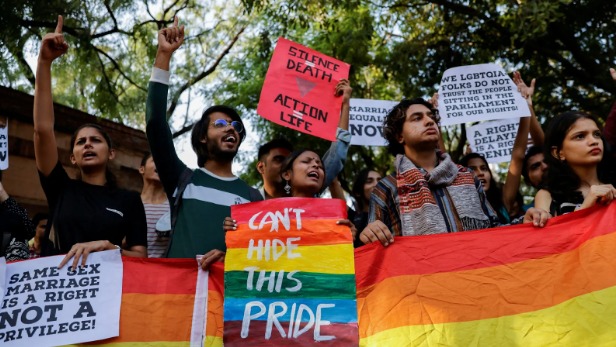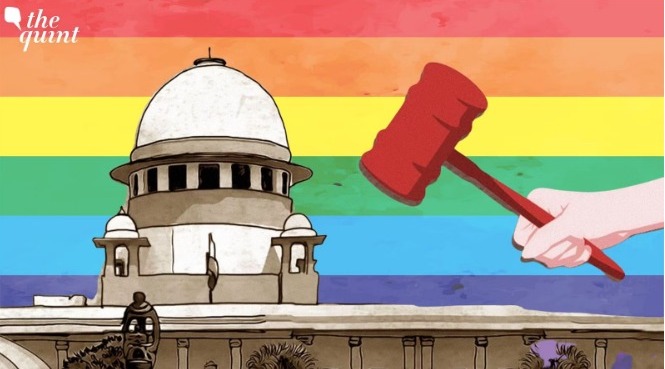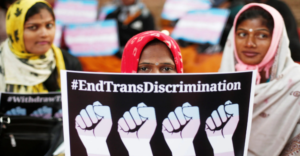Introduction
The Supreme Court of India, in the much-awaited judgment on same-sex marriage, has given its verdict against the demand. While many say that the decision is relevant in the Indian context, ethos, and culture, it has been condemned by the LGBTQIA+ Community and supporters.
In such a context, it becomes extremely important to know the technicalities of the judgment before making an opinion of the same. Hence, this article delves into the nitty-gritty of the decision by the Supreme Court and covers all the important aspects.
What does the Verdict say?
The verdict of the Supreme Court essentially largely denied LGBTQIA+ couples the right to same-sex marriage. The Supreme Court said that marriage is not a fundamental right and so, same-sex couples do not have the right to marriage.
The decision was taken by a five-judge bench of the Supreme Court that was headed by Chief Justice of India DY Chandrachud. The bench unanimously ruled against legalizing same-sex marriage in India on October 17. The bench comprised Justices Sanjay Kishan Kaul, Ravindra Bhat, Hima Kohli, and PS Narasimha. It ruled in a 3:2 verdict against civil unions of non-heterosexual couples.
It was the CJI and Justice Kaul who supported this union of non-heterosexual couples. Justice Kaul remarked that allowing and voting in favor of the civil union of non-heterosexual people will be a step towards more acceptance of the LGBTQIA+ community and marriage equality.
Parliament’s Role
The Supreme Court ruled that it is in the jurisdiction of the Parliament to make such laws and thus, the Supreme Court cannot amend or strike down the provisions of the Special Marriage Act.
And even though there were disagreements in 3:2, the majority agreed that it is the legislature or the parliament that must bring in same-sex marriage.

Challenges and Potential Future
The LGBTQIA+ Community continues to suffer, both in the legal sphere and the social sphere. There are significant challenges to legalizing same-sex marriage in India:
- Legal Void: The absence of specific legislation recognizing same-sex marriage means that couples often face hurdles in terms of inheritance, property rights, and adoption.
- Religious and Cultural Opposition: India is a diverse country with various religious and cultural beliefs. Some conservative factions oppose same-sex marriage on religious and traditional grounds.
- Political Considerations: Policymakers may be hesitant to address this issue, given the sensitivity and potential backlash from conservative constituents.
- Activism and Advocacy: LGBTQIA+ rights organizations and activists continue to press for equal marriage rights, emphasizing the importance of recognizing love and commitment irrespective of gender.
The future of same-sex marriage in India depends on continued efforts to change societal norms and legal frameworks. It will require open dialogue, education, and advocacy to challenge discriminatory beliefs and practices.
Policymakers will play a crucial role in drafting and passing legislation that recognizes and protects the rights of LGBTQ+ individuals, including the right to marry. Especially now, in a context where there can be no hope from the Supreme Court anymore since it has already ruled against the same and passed the responsibility of accepting same-sex marriage to the Parliament of India.
Conclusion
There were too many non-heterosexual couples with their hopes high on this judgment. On one hand, many people have appreciated and applauded the decision taken by the Supreme Court. This is well expected given the negligence and backlash that the LGBTQIA+ has always suffered. But it in no way justifies the oppression these people go through.
On the other hand, the Supreme Court’s decision on same-sex marriage has been strongly condemned by non-heterosexual people and their supporters. Even though the condition of LGBTQIA+ has improved given the historical context, there still needs to be much more equality and consideration that they must be given.
-ADITYA SRIVASTAVA
MUST READ: WAR CRIMES AND WOMEN: A DARK HISTORY





